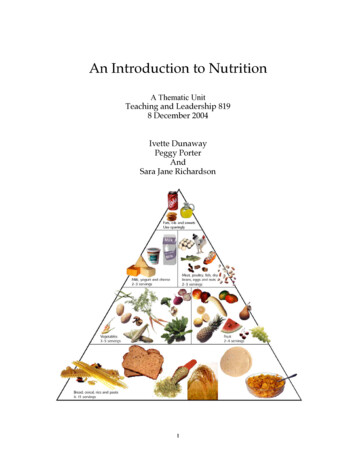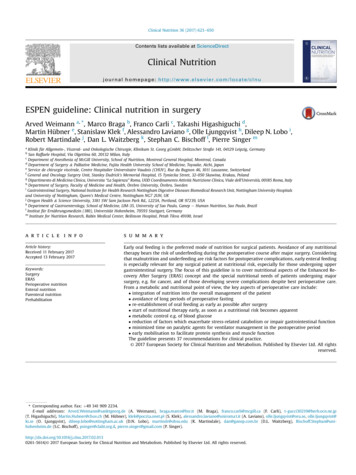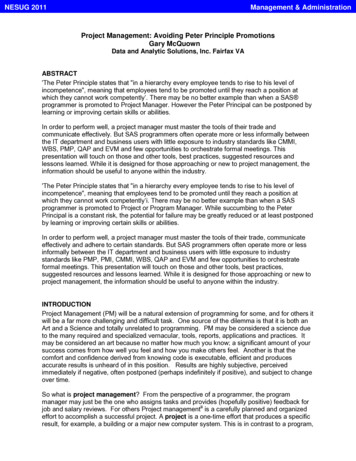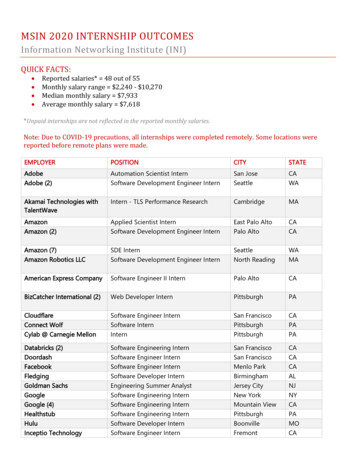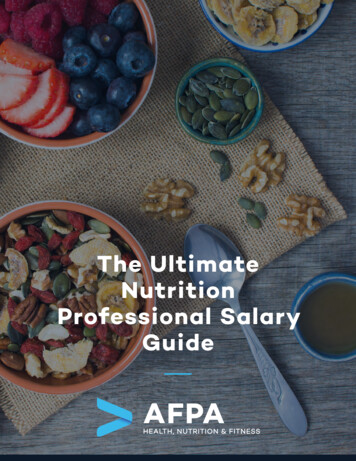
Transcription
The UltimateNutritionProfessional SalaryGuide
IntroductionThe health and wellness industry is booming, and it shows no signs of stopping.While many people want to lead overall healthier lifestyles, others are concernedabout factors like obesity, out-of-pocket healthcare costs, and rising rates ofchronic disease.In either case, there has been a fundamental shift toward people caring abouttheir health and wellness, and society has adapted accordingly. Just look at theprevalence of boutique fitness studios, juice bars and better-for-you fast-casualrestaurants.Another part of that shift is people looking for guidance when it comes tonutrition and the science behind it. What’s actually going to work? What issustainable for the long term? Nutrition professionals are perfect for helpingpeople answer their burning questions when it comes to nutrition.THE ULTIMATE NUTRITION PROFESSIONAL SALARY GUIDE2
INTRODUCTIONAs a nutrition expert, you can help clients navigate the challenge that comeswith meal planning, individualized nutrition needs, everyday food choices, andpairing nutrition with fitness. The path to true health is a personal one, and what’sright for one person might not work for another. Because of that, many peopleare looking toward professionals who can offer guidance on those personalizedchoices.In this guide, we’ll take a look at what kind of salary ranges you can expect asa nutrition professional and delve into the factors that might determine yourincome. No matter what you choose, nutrition is an exciting, growing field that isrich with earning possibilities. Let’s get started!- Harvey Slater, AFPA Holistic NutritionistTHE ULTIMATE NUTRITION PROFESSIONAL SALARY GUIDE3
Top Salary FactorsAccording to the Bureau of Labor Statistics, the national median salary fornutrition professionals is about 60,000, with top pay coming in at more than 80,000. But earning potential can vary greatly, especially if you use your skillsand insight for both salaried and non-salaried opportunities.Before exploring specific salary ranges for typical nutrition careers (look for thatinfo in the next section), it’s important to note that income tends to fluctuatebased on a number of factors:Location:A nutrition professional at an elite spa in New York City and a sports nutritionistin Kansas City simply won’t make the same salary. Like every other profession,location will be an element in your salary negotiations. Keeping location in mindwhen setting salary expectations is crucial when you’re evaluating opportunities,particularly if you’re considering relocation to a new area. Not all nutritionpositions will be staff jobs, but looking at those types of employment ads shouldgive you an idea of salary ranges, and that can be helpful in setting rates as aTHE ULTIMATE NUTRITION PROFESSIONAL SALARY GUIDE4
TOP SALARY FACTORSconsultant. Keep in mind that this is relevant for full-time salaried positions andlocal opportunities. Some nutritionists see clients online, and therefore locationmight not even play a role in their annual income, as long as they can attractenough clients. More on how to begin an online business here.“Like every other profession, locationwill be an element in your salarynegotiations.”- Harvey Slater, AFPA Holistic NutritionistTHE ULTIMATE NUTRITION PROFESSIONAL SALARY GUIDE5
TOP SALARY FACTORSEducation:Having an interest in nutrition is vital, but you’ll also be considered for a muchhigher salary if you have the knowledge to go with your passion. Educationnot only gives you the information you need to communicate nutrition topicseffectively but also gives employers and clients confidence the information you’resharing is accurate. Many employers won’t even consider you for a nutritionprofessional position without some type of credential. When it comes to nutritioneducation, there are two main tracks you can follow. Choosing one or the otheris usually the first step toward becoming a nutrition professional, although it’sentirely possible to blend them in some way as well.College degree:Some universities offer a Bachelor of Science in nutrition and/or dietetics. Muchlike any other degree, this usually involves at least four years of higher education,and it can be done online, at a school, or with a blend of those two approaches.After some time in the field, some nutrition professionals decide to increase theireducation by completing a master’s or doctorate degree. Those advanced degreesare usually undertaken to pursue a teaching or research position. A degree offerspotentially more opportunities in the field, including working at hospitals andhealthcare systems. That said, it takes four years for a bachelor’s—plus at least twomore for a master’s and a minimum of two more for a doctorate—and requiresstandard college tuition fees, which can amount to thousands of dollars for eachyear of education.- Harvey Slater, AFPA Holistic NutritionistTHE ULTIMATE NUTRITION PROFESSIONAL SALARY GUIDE6
TOP SALARY FACTORSCertification:Geared toward a career of helping clients achieve nutrition goals, a certificationprogram focuses on both nutrition basics and the complexities that can come upin the field. Some programs offer a specialized approach, such as education thatfocuses on weight management or sports nutrition. There are some in-personprograms, but many people choose to do their education through online learning.Some positions will be unattainable without a college degree—particularly thosein research and certain healthcare settings—but the opportunities are often stillabundant with a certification. Also, a program usually takes about six months andis much more affordable than a college degree. Many people appreciate that ithelps them get into the field much faster and with less investment than formaleducation.- Harvey Slater, AFPA Holistic NutritionistTHE ULTIMATE NUTRITION PROFESSIONAL SALARY GUIDE7
TOP SALARY FACTORSExperience:Like other professions, your background can determine whether or not you’rein a higher salary bracket than others who are just starting out in the field. Evenif you’ve just earned a certification, your salary could be slightly higher if you’veworked in the health and wellness industry in some capacity for at least a fewyears. For example, you might be a personal trainer who’s adding nutrition insightsto your services. That would mean you already have a client roster and a solidsalary or compensation base, and you’re adding to it with nutrition expertise.That would differ from someone who’s just coming into the field and has to buildup a client base. Also, keep in mind that many types of experience can play into acareer as a nutrition professional. For example, you might have past employmentin marketing, sales, financial management, or customer service. As a nutritionprofessional, you’ll need skills in these areas to grow your business or client base.When considering how to increase your salary, take a moment to review your skillset and previous experience and see how they might be utilized for your nutritionbusiness. When you do, it’s possible that you could negotiate your way into ahigher starting salary.“Also keep in mind that many types ofexperience can play into a career as anutrition professional.”THE ULTIMATE NUTRITION PROFESSIONAL SALARY GUIDE8
TOP SALARY FACTORSSpecialization:An area of specialization can set you apart from other nutrition professionals,especially in locations where a specialty would be particularly useful. Someexamples are:Holistic Nutritionist: If you pursue a certification directly related to holisticnutrition, you’ll look at a person’s mental, physical, and social factors in additionto their food habits. Holistic nutritionists understand that these factors are allintimately interconnected. As a holistic nutritionist, you’ll be able to work insettings such as wellness spas, hospitals, gym franchises, or on your own with anonline business. Holistic nutritionists may also work in facilities that help thosewith eating disorders, which almost always are intertwined with other emotionaland social factors.Sports Nutritionist: With a certification on sports-related topics, you can workin a variety of settings, including consulting a professional or semi-professionalteam or seeing clients at a gym or fitness center. Sports nutritionists are alsoin high demand at some rehabilitation centers so that physical therapy andoccupational therapy can be supported by proper nutritional techniques. Somesports nutritionists also work as independent consultants and offer their servicesto individual professional and amateur athletes who want to enhance theirperformance.THE ULTIMATE NUTRITION PROFESSIONAL SALARY GUIDE9
TOP SALARY FACTORSCommitment:Though you can’t hold on to a piece of paper detailing your level of commitment,motivation and dedication are key factors of career success. An employer wantsto see that you’re dedicated to the field and that you’re serious about helpingclients achieve their goals. A certification can go a long way toward ensuringthis level of confidence in your abilities and so can a commitment to ongoingeducation. Nutrition is a continually changing field, so you need to be able to showyou’re ready to keep learning as a way to stay fresh and informed.“A certification can go a longway toward ensuring this level ofconfidence in your abilities and so cana commitment to ongoing education.”Think about it this way: Would you be more likely to hire someone who obtainedcertification 10 years ago and hasn’t updated their credentials since or someonewho emphasizes a love for the field and its fast-moving research? Most employerswould go for the latter. With those factors in mind, we can take a closer look atwhat some typical career options look like for nutrition professionals—and whatyour salary might be if you choose one of them.THE ULTIMATE NUTRITION PROFESSIONAL SALARY GUIDE10
Career OpportunitiesKeeping in mind that salaries will vary based on factors like location andexperience, the nutrition field can definitely give you a solid and even lucrativecareer while doing something that you love. Here are some typical careeropportunities you may want to consider:Independent Nutrition ProfessionalTypical salary range: 38,000 to 84,000 *Some nutrition professionals do very well by acting as independent contractors,which means they establish their own consulting business and then train clients inmultiple settings. For example, they might meet clients in their homes or in otherplaces such as hospitals, physical therapy centers, or even a local coffee shop.Many nutrition consultants work with clients over the phone or online, whichallows them the ability to take on clients across the country. The structure willvary by person, but many independent nutrition professionals will provide clientswith personalized advice, online food journals, and customized plans sent byemail.THE ULTIMATE NUTRITION PROFESSIONAL SALARY GUIDE11
CAREER OPPORTUNITIESThere’s an enormous appeal in doing independent consulting because you canoften set your own hours, be your own boss, and earn more income based onhow aggressively you market your services. However, this option may not be idealfor those who want a more established income that doesn’t vary much month tomonth. But if you can handle some income uncertainty and like the challenge ofbeing creative with your time and marketing smarts, this could be a great choice.As you’ll see, the salary range is very broad. That’s because an independentprofessional’s income will depend largely on factors such as client loyalty,marketing success, and hours spent with clients. Some professionals might work60 to 70 hours on the business—putting together social media campaigns thatbring in more clients, creating online workshops, developing basic meal plans thatcan be sent to clients—and their income will rise as a result.THE ULTIMATE NUTRITION PROFESSIONAL SALARY GUIDE12
CAREER OPPORTUNITIESCorporate Nutritional ConsultantTypical salary range: 38,000 to 170,000 Companies are realizing that healthy employees are more productive, efficient,and collaborative. That’s led to big steps forward in implementing employeehealth and wellness plans. At larger companies, they’re going one step further byemploying nutritional consultants on a contract or full-time basis for duties suchas consulting with employees individually, leading workshops on better healthstrategies, developing meal options for employee cafeterias, and spearheadinghealthy-food initiatives.“Companies are realizing that healthyemployees are more productive,efficient, and collaborative.”This has led to huge opportunities for nutrition professionals, particularlythose who work with several companies simultaneously. Depending on thetypes of companies and the scale of the project, the top earners can earn over 100,000. In some areas, it may take more effort and marketing initiatives toconvince corporate executives to implement nutrition into their wellness mix,but fortunately, there’s a great deal of research about the benefits of a healthyworkforce. Tapping into this trend could bring long-term work and higher salariesfor those who choose this as an area of specialization.THE ULTIMATE NUTRITION PROFESSIONAL SALARY GUIDE13
CAREER OPPORTUNITIESWeight Management ProfessionalTypical salary range: 21,000 to 45,000 Many people become interested in changing their diets because they feelthe need to lose weight. That’s led to a surge in opportunities for nutritionprofessionals who can turn research data and cutting-edge insights into workableaction plans for clients. Employment settings might include formal weightmanagement programs, healthcare offices, fitness centers, rehab facilities, andwellness spas. There’s also an opportunity to add this to other education efforts.For example, a personal trainer who notices that the majority of his or her clientsare struggling with weight may want to add this specialization in order to create amore rounded complement of services.THE ULTIMATE NUTRITION PROFESSIONAL SALARY GUIDE14
CAREER OPPORTUNITIESNutrition Program DeveloperTypical salary range: 22,000 to 71,000 Being able to design a nutrition program for both individuals and groups is adistinctive skill that’s welcomed in many settings, from fitness facilities to resortsto rehab centers. A program developer doesn’t just set meal plans—although that’soften part of the role—but also sees the larger benefits of a program and canarticulate its advantages. For example, a professional may be working in a seniorcare setting and will create several nutrition programs that are tailored to theneeds of those clients, such as developing a heart-healthy diet, a weight-loss diet,and a diabetes-control diet.“Being able to design a nutritionprogram for both individuals andgroups is a distinctive skill that’swelcomed in many settings, fromfitness facilities to resorts to rehabcenters.”These positions are sometimes done on a contract basis, which creates a morevariable salary range. Either way, being able to create programs that address thehealth needs of several clients at once is often a very satisfying track for manynutrition professionals.THE ULTIMATE NUTRITION PROFESSIONAL SALARY GUIDE15
CAREER OPPORTUNITIESNutrition EducatorTypical salary range: 31,000 to 51,000 Although every nutrition consultation session involves education, there’s alsothe opportunity to take on a larger role when it comes to developing materialthat reaches a wider audience. For example, you might put together class seriesthat are taught at community centers, spas, fitness centers, or online throughwebinars. You can also develop one-day workshops on specific topics such asweight loss, sports performance, plant-based eating, or senior nutrition. The skillsyou learned during a certification program about marketing, communication, andbusiness strategy are used to great effect in this role.Income can be steady if you have a salaried position at a place such as a schoolor fitness center, but often, professionals incorporate nutrition education into abroader suite of services. For instance, they may take clients online and in personduring the day and hold workshops and classes during evenings and weekends.As you may have noticed, the salary ranges for all of these opportunities canbe broad, but that’s often because your skills put you in a unique position toearn more based on your efforts—taking on more individual clients, developingworkshops, and leading marketing campaigns can all bump you into the higher endof these ranges and even beyond.THE ULTIMATE NUTRITION PROFESSIONAL SALARY GUIDE16
Launching YourCareerAlthough many people might think that nutrition professionals only take onpatients in a hospital setting—which can be a satisfying career option in and ofitself—there are many more options available these days.Because of the huge boom in wellness, these professionals are highly sought-after,especially if they have the credentials and knowledge necessary to earn highersalaries. Not only can you work in multiple settings as a nutrition professional, butyou can also pursue additional specialty certifications that allow you to addressthe needs of certain populations, such as competitive athletes or those tryingto lose weight. In addition to helping individual clients in person, you can leadclasses and workshops; do online consultations; team up with fitness professionalsfor tailored programs; and develop programs for spas, schools, rehab centers,and more. With every opportunity comes new income potential, increasing yourannual salary along the way. To learn more about certifications that could putyou on a nutrition professional career path, visit the website for American FitnessProfessionals & Associates (AFPA).THE ULTIMATE NUTRITION PROFESSIONAL SALARY GUIDE17
Turn Your Dream Careerinto Reality.Enroll NowAmerican Fitness Professionals & Associates800.494.7782 info@afpafitness.comTHE ULTIMATE NUTRITION PROFESSIONAL SALARY GUIDE18
A nutrition professional at an elite spa in New York City and a sports nutritionist in Kansas City simply won't make the same salary. Like every other profession, location will be an element in your salary negotiations. Keeping location in mind when setting salary expectations is crucial when you're evaluating opportunities,

